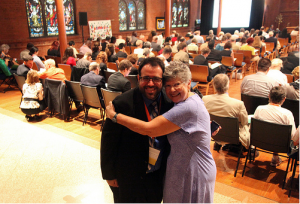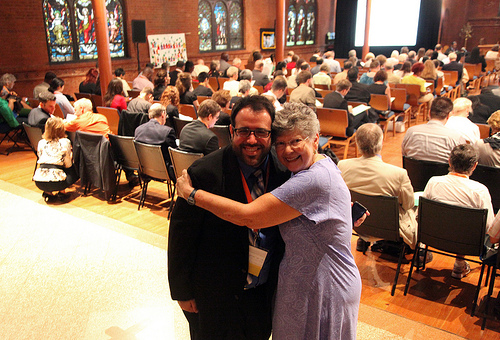The Fast I Choose: Fasting and the Mission of the Prophetic Voice – John Gromek
 Probably in no other Christian tradition is food more integrated into sacramental and spiritual life than in Greek Orthodox Christianity. The Orthodox Memorial Service features the “koliva”, a ritual food of boiled wheat symbolic of both death and resurrection. Honoring Jesus’ feeding of the 5000, the Blessing of the Loaves (Artoklasia) is a brief service of thanksgiving through which we may express our gratitude for all the blessings of life by praying over, breaking and sharing five loaves of bread.
Probably in no other Christian tradition is food more integrated into sacramental and spiritual life than in Greek Orthodox Christianity. The Orthodox Memorial Service features the “koliva”, a ritual food of boiled wheat symbolic of both death and resurrection. Honoring Jesus’ feeding of the 5000, the Blessing of the Loaves (Artoklasia) is a brief service of thanksgiving through which we may express our gratitude for all the blessings of life by praying over, breaking and sharing five loaves of bread.
Even the sacrament of Holy Communion involves the consecration of red wine and a small, leavened loaf of bread called the “prosphoron.” Its not surprising though. Food is the one thing that connects us all. In a literal sense we all just receive “our daily bread” to be physically sustained and nourished so we can reach the full potential given to us by our Creator. It is also what brings us together as a human family and as brothers and sisters in Christ. We are all called to have a place at God’s table and and it is through the sacrament of receiving Eucharist we come together to receive Him and serve each other.
Just as food is ever present in the sacramental life of the Orthodox Christians, so is fasting from food. If we are to prepare for the wonders of the sacraments we must not simply pray, study Scripture and avoid sin, but also fast. Orthodox Christians fast to prepare, not just for Holy Communion, but in preparation for the birth and resurrection of Christ. Growing up in the Greek Orthodox Church, the coming of Lent meant one thing: fasting. The Fast of Great Lent is a strict one, wherein the faithful abstain from meat, dairy, alcohol and even oils, and opt for smaller, simpler fare. As a child, I identified Lent as a never-ending time of rules and guidelines on what I could and could not eat. It meant eating my morning cereal with orange juice instead of milk, foregoing pizza with my friends, and rushing to my grandma to ask for forgiveness when I would absentmindedly consume some chocolate. (As spiritual matriarch of our family, she was charged with dispensing absolution for such infractions with a short prayer whispered under her breath as she made the sign of the cross over you. Grandmothers: what can’t they do!?)
With all the rules of fasting it can be easy to get bogged down in the minutiae of tradition and customs and lose sight of the real reason of the fast. Fasting, first and foremost, makes assumptions. It assumes we have enough to fast from; that we are not one of the 49 million people in the United States who suffer from food insecurity or one of the 870 million globally who suffer from chronic undernourishment. But scripture tells us that it is not the poor who need to fast. In the gospel of Luke we learn that the poor and hungry are already blessed (Luke 6:20–22). They will inherit the kingdom of God and be satisfied.
For many Orthodox Christians, fasting is an attempt to strengthen our spiritual relationship with our Creator by stripping away the worry, distractions of the petty and secular through simplicity and solidarity with the poor. Fasting is a means of preparation and conditioning for our sacramental life, to serve God and our neighbor. Theo Nicolakis, an orthodox lay person, points out in a recent sermon that, “If fasting is not accompanied by good works, then that fast is dead. That fast is merely a dead ritual, devoid of the presence of God. If fasting becomes merely an exercise of abstaining from food, then its true purpose has become lost.”
I once heard a priest describe the point of fasting by telling a young parishioner that “ it is much more about the words that come out of your mouth than the food you put in it.” Fasting hearkens the image of Jesus fasting in the desert and being tempted by the devil to turn stones into bread (Matthew 4:1-11), to which he responds, “It is written: ‘Man shall not live on bread alone, but on every word that comes from the mouth of God.’”
This Lent, we seek to listen more carefully to the words that come from God’s mouth, whether in prayer or scripture so that we may order our steps and words in that example to be true missionaries in our world. Speaking through the prophet Isaiah, God reminds us that “this the fast that I choose: to loose the bonds of injustice, to undo the thongs of the yoke, to let the oppressed go free, and to break every yoke? Is it not to share your bread with the hungry, and bring the homeless poor into your homes; when you see the naked, to cover them, and not to hide yourself from your own kin?”
Throughout the Bible, we see the clear commandment to serve the poor and hungry and to bring justice in building the Kingdom. Let us be just as mindful of what comes out of our mouths as what we put in them, so that we may be powerful prophetic voices with all those who hunger and seek their daily bread at God’s table.
Jon Gromek currently serves as Central Regional Organizers for Bread for the World, a Christian voice urging our nation’s decision makers to end hunger at home and abroad. He has organized and worked throughout faith communities both in Washington DC, Ohio, and Florida for over 10 years. He holds a degree in Theology and Political Science from Xavier University in Cincinnati and is currently pursuing a graduate degree at Wright State University. He has worked at the Catholic Campaign for Human Development, Sojourners, Network, a National Catholic Social Justice Lobby, and as a community organizer for congregation based community organizations in Ohio and Florida in the DART Network. He is active in the life of his local church community serving as an officer on the Parish Council of Annunciation Greek Orthodox Church in Dayton, OH. He and his wife Colleen live in Dayton, OH.

